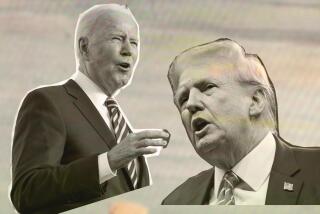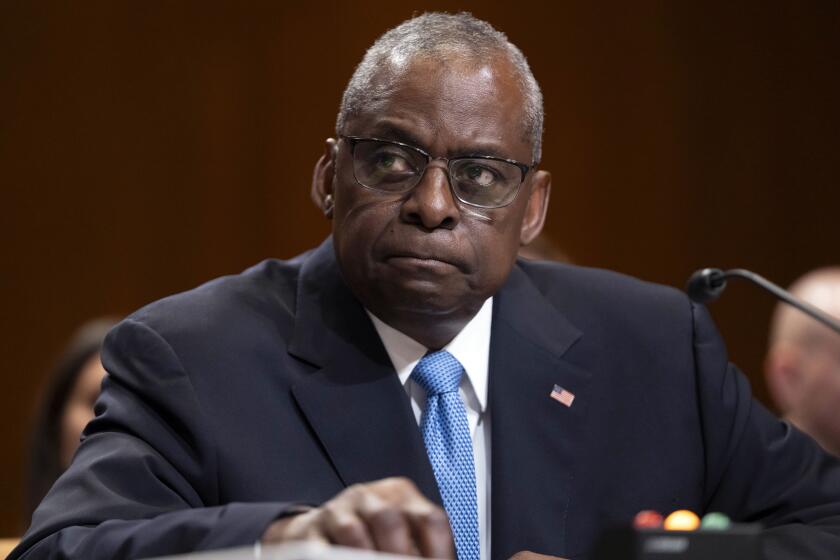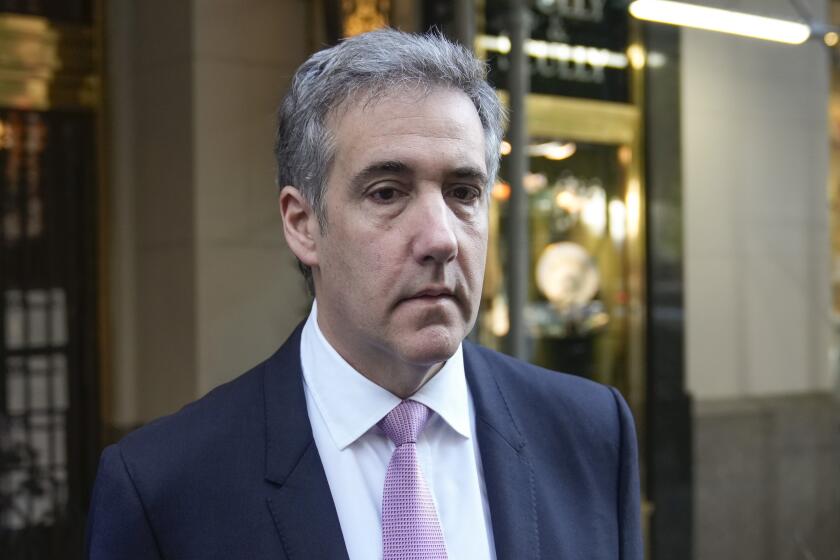Energy Plans Must Be Wired to Weather a Ballot Backlash
As state leaders struggle to plot a course out of California’s energy mess, many are haunted by a sense of dread that can be summed up in three words:
What about Harvey?
Harvey Rosenfield is a consumer activist who embodies an inescapable reality of modern California lawmaking: Very little gets done without consideration of the ballot initiative it might provoke.
Some of the most contentious issues confronting the Golden State--from immigration and affirmative action to gay rights and Indian casinos--have wound up as the subjects of bitter, expensive ballot fights that often leave tangled legacies.
Eager to avoid such a fate, politicians tackling the energy crisis are striving to inoculate their array of fixes with immunity from a ballot box backlash. Some call that strategy “Harvey-proofing.”
The shorthand phrase is a salute to Rosenfield’s status as a leader of voter revolts. A disciple of Ralph Nader, the Angeleno has been a driving force behind some of California’s biggest ballot wars, including a 1988 measure that cut insurance rates and an expensive, though losing, effort to tighten regulations on HMOs.
“The governor could come up with the most ingenious plan imaginable to solve this problem, and it could be undone by an initiative in one fell swoop,” said Garry South, chief political strategist for Gov. Gray Davis. “That’s a fact of life in California that we can’t ignore.”
At a minimum, Harvey-proofing means ensuring that Rosenfield--and other consumer advocates scrutinizing every nuance of the energy crisis--is given a voice in fashioning responses to the utilities’ debt, the electricity supply shortage and other problems.
Consumer groups are invited to testify at hearings, pull up chairs at strategy sessions and offer ideas for bills. Although they may lack the easy access to the governor enjoyed by utility executives, they are welcome in most legislative offices. And they have a powerful friend under the Capitol dome--the leader of the state Senate, Democrat John Burton of San Francisco.
In crafting remedies to ease the energy crisis, politicians are betting that two Burton proposals--creation of a public power authority and state purchase of California’s electric transmission lines--will help win over consumer activists. Indeed, the transmission grid deal has become the centerpiece of a utility rescue plan being pushed by Davis.
“The governor’s plan is based on merit, not politics,” said Davis spokesman Steve Maviglio. “But we’ve been gathering input from these consumer groups all along. The governor has met with them, and he knows the utility lines have appeal for them.”
Maviglio added that Davis had ruled out a specific rate hike in his plan, knowing “that would spark an initiative immediately.” But some activists say the proposed “dedicated rate component” that the governor’s plan would allow on ratepayers’ bills is a surcharge and effectively a rate increase in disguise.
“It looks to me like he’s trying to hide an out-and-out bailout in the fine print,” Rosenfield said. “It will be interesting to see how stupid they think the voters are.”
Burton said the consumer groups’ presence “lets everybody know that if we don’t adequately protect the interests of ratepayers, there will be an initiative that would probably pass in a heartbeat.”
Lawmakers and Davis desperately want to dodge that scenario. A ballot measure, they worry, would create turmoil and unpredictability, discouraging investment by power companies that the state needs to boost electricity supplies.
As proof of that cause-and-effect phenomenon, legislators cite a 1998 initiative sponsored by Rosenfield, Proposition 9, that they say delayed the activation of numerous power plants. The measure, which sought to cut utility rates and end nuclear power subsidies, failed badly, but the energy industry spent $40 million to fight it.
“Prop. 9 caused two years of delay because of the uncertainty it created in our state,” Sen. Debra Bowen (D-Marina del Rey) said. “We’d have a lot of new plants online now if not for that.”
Power generators echo that view.
“Right now in California, we have $10 [billion] to $14 billion in private investment capital coming in to build power plants,” said Jan Smutny-Jones, executive director of the Independent Energy Producers Assn. “But if you get an initiative seeking to do something like seize private property, that capital is going to go away.”
Politicians have other reasons to fear an initiative: political ones. Would anyone want to run for reelection on a 2002 ballot that features a reminder of blackouts, ballooning utility bills and the state’s botched deregulation experiment? Certainly not Davis, whose presidential prospects--and bid for a second term as governor--may well turn on his handling of the energy debacle.
Already, Rosenfield is considering possible slogans for an initiative campaign and coining nicknames for those he accuses of sympathizing with utilities. Davis, for example, is “Giveaway Gray,” and Assembly Speaker Bob Hertzberg (D-Sherman Oaks) is “Bailout Bob.”
“Nobody wants to give Harvey a vehicle to tell voters how the Legislature blew it and failed 34 million Californians,” said one Senate aide who insisted on anonymity. “An initiative would just keep the issue hot at the very time we hope to be saying it’s over.”
Rosenfield, 48, insists that he prefers to avoid another trip down initiative lane. He has walked the road many times before and says he’d rather not have to raise the $7 million he estimates that it would take to wage a ballot fight over energy.
Nevertheless, he held a Capitol news conference late last year to unveil a possible 2002 initiative that would authorize re-regulation of the electric industry and, among other things, a windfall profits tax on utility rates. At the time, he characterized the proposal as a take-it-or-leave-it offer to the Legislature, telling reporters, “We don’t compromise.”
Rosenfield says he can make such bold pronouncements because the flood of e-mails and contributions to his Santa Monica-based Foundation for Taxpayer and Consumer Rights suggest that Californians are fed up and getting madder by the day.
“If residential ratepayers are forced to bail out the utility companies for the mistakes the companies made under the deregulation law, nobody will be able to stop us,” he declared.
Such blunt talk does not make Rosenfield a widely beloved guy in the Capitol. Still, some lawmakers say they see value in the threat of a voter revolt. Burton, for one, says he uses fear of an initiative as a lever in negotiations with the energy industry.
“You ask them, ‘Do you want to deal with us or do you want to face that?’ It helps in terms of having some leverage with the big boys,” he said.
“Initiatives are the great equalizer,” added Assembly Speaker Pro Tem Fred Keeley (D-Boulder Creek). “The utilities can say, ‘We are going bankrupt unless we get what we need to become credit-worthy.’ Well, Harvey can’t say that. But he can say he’ll do an initiative, and that, like bankruptcy, would be a very negative outcome.”
The concept of Harvey-proofing may be front and center now, but it is by no means new. In fact, one element of the 1996 bill creating electricity deregulation marked an attempt to consumer-proof that legislation. To appease consumer groups, lawmakers rolled back rates for utility customers by 10% until March 31, 2002, or until the utilities paid off their past investments, whichever came first.
As a result, when the bill went to then-Gov. Pete Wilson for signature, only one significant consumer voice--Consumers Union representative Harry Snyder--called for its veto.
But the rate freeze backfired. By preventing the utilities from passing on their costs for higher-priced energy, it became a major factor pushing them to the brink of bankruptcy.
Despite that turn of events, Keeley says the need to Harvey-proof legislative solutions is a positive exercise. But he cautions that consumer groups--and other players--must wield their leverage responsibly.
“Politics is the art of the possible,” he said. “No one--not the utilities, not the generators, not the consumer groups--can reasonably expect to get 100% of what they want.”
Rosenfield says he hopes that legislation will produce solutions that consumer groups can live with. But he’s wary of negotiations underway on a legal settlement addressing the question of the utilities’ multibillion-dollar debt.
Edison has sued the California Public Utilities Commission, saying the state must permit it to pass on to consumers the skyrocketing cost of electricity. A ruling in the utility’s favor could lead to rate hikes of 70% for Edison customers.
Alarmed by that prospect, Davis wants to resolve the debt issue before the court acts. Last Friday, Davis announced that Edison has agreed in principle to dropping its lawsuit in exchange for the state’s financial help. The utility refused to comment.
Rosenfield fears that the terms of such a resolution--if cocooned within a court settlement--would be legally immune to a ballot referendum. Two lawyers who specialize in election law agree.
Consumers could, however, mount an initiative addressing other aspects of the industry. Rosenfield said that’s a sure thing if politicians try to use the court settlement to “slip a bailout deal past the people.”
“I think any elected official should be very wary of jamming something through in secret before [consumer advocates] have a say on it” in the legislative arena, he said.
Keeley, who has been briefed on the settlement negotiations, says he has heard of no such scheme. And judging by South’s comments, Davis aims to do whatever he can to minimize the risk of an initiative that, South says, could “turn everything upside down again and foul the system up even more.”
In discussing the electricity problem with federal energy regulators, President Bush, former President Bill Clinton and two U.S. Energy secretaries, Davis has repeatedly said that the threat of a “draconian, simplistic ballot measure” limits what he can do, South said.
“The Washington establishment doesn’t really get it, but [an initiative] is always a specter that is hanging out there in California when a very high-profile, very salient public policy matter like this comes on people’s radar screens,” South said. “You ignore that specter at your own peril.”
*
Times staff writer Dan Morain contributed to this story.
More to Read
Get the L.A. Times Politics newsletter
Deeply reported insights into legislation, politics and policy from Sacramento, Washington and beyond. In your inbox three times per week.
You may occasionally receive promotional content from the Los Angeles Times.






